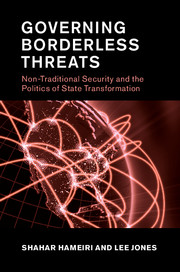Crossref Citations
This Book has been
cited by the following publications. This list is generated based on data provided by Crossref.
Lemon, Edward J.
2016.
Building resilient secular citizens: Tajikistan’s response to the Islamic State.
Caucasus Survey,
Vol. 4,
Issue. 3,
p.
261.
BOIN, ARJEN
and
LODGE, MARTIN
2016.
DESIGNING RESILIENT INSTITUTIONS FOR TRANSBOUNDARY CRISIS MANAGEMENT: A TIME FOR PUBLIC ADMINISTRATION.
Public Administration,
Vol. 94,
Issue. 2,
p.
289.
Gross, Matthias
2016.
Risk as zombie category: Ulrich Beck’s unfinished project of the ‘non-knowledge’ society.
Security Dialogue,
Vol. 47,
Issue. 5,
p.
386.
Sandor, Adam
2016.
Tightly Packed: Disciplinary Power, the UNODC, and the Container Control Programme in Dakar.
African Studies Review,
Vol. 59,
Issue. 2,
p.
133.
Bossong, Raphael
and
Wagner, Ben
2017.
A typology of cybersecurity and public-private partnerships in the context of the EU.
Crime, Law and Social Change,
Vol. 67,
Issue. 3,
p.
265.
Cerny, Philip G
and
Prichard, Alex
2017.
The new anarchy: Globalisation and fragmentation in world politics.
Journal of International Political Theory,
Vol. 13,
Issue. 3,
p.
378.
Hameiri, Shahar
Jones, Lee
and
Sandor, Adam
2018.
Security Governance and the Politics of State Transformation: Moving From Description to Explanation.
Journal of Global Security Studies,
Vol. 3,
Issue. 4,
p.
463.
Hegemann, Hendrik
and
Kahl, Martin
2018.
Security governance and the limits of depoliticisation: EU policies to protect critical infrastructures and prevent radicalisation.
Journal of International Relations and Development,
Vol. 21,
Issue. 3,
p.
552.
Bal, Charanpal S.
and
Gerard, Kelly
2018.
ASEAN’s governance of migrant worker rights.
Third World Quarterly,
Vol. 39,
Issue. 4,
p.
799.
Park, Susan
2018.
International Organisations and Global Problems.
Bossong, Raphael
and
Wagner, Ben
2018.
Security Privatization.
p.
219.
Hameiri, Shahar
and
Scarpello, Fabio
2018.
International development aid and the politics of scale.
Review of International Political Economy,
Vol. 25,
Issue. 2,
p.
145.
Scarpello, Fabio
2018.
Beyond Copenhagen: The Political Economy of Securitising “Outside Influences” in Bali.
Journal of Contemporary Asia,
Vol. 48,
Issue. 1,
p.
1.
Gerard, Kelly
2018.
ASEAN as a “Rules-based Community”: Business as Usual.
Asian Studies Review,
Vol. 42,
Issue. 2,
p.
210.
Rasheed, Athaulla A.
2019.
Role of Small Islands in UN Climate Negotiations: A Constructivist Viewpoint.
International Studies,
Vol. 56,
Issue. 4,
p.
215.
Cardoso, Daniel
2019.
From centralisation to fragmentation and back again: the role of non-state actors in Brazil’s transformed foreign policy.
Third World Quarterly,
Vol. 40,
Issue. 8,
p.
1535.
Karim, Moch Faisal
2019.
State transformation and cross-border regionalism in Indonesia’s periphery: contesting the centre.
Third World Quarterly,
Vol. 40,
Issue. 8,
p.
1554.
Jones, Lee
2019.
Theorizing Foreign and Security Policy in an Era of State Transformation: A New Framework and Case Study of China.
Journal of Global Security Studies,
Vol. 4,
Issue. 4,
p.
579.
Jenne, Nicole
and
Chang, Jun Yan
2019.
Hegemonic Distortions: The Securitisation of the Insurgency in Thailand's Deep South.
TRaNS: Trans -Regional and -National Studies of Southeast Asia,
Vol. 7,
Issue. 2,
p.
209.
Ditrych, Ondrej
2019.
Georgia’s frosts: ethnopolitical conflict as assemblage.
Asia Europe Journal,
Vol. 17,
Issue. 1,
p.
47.



